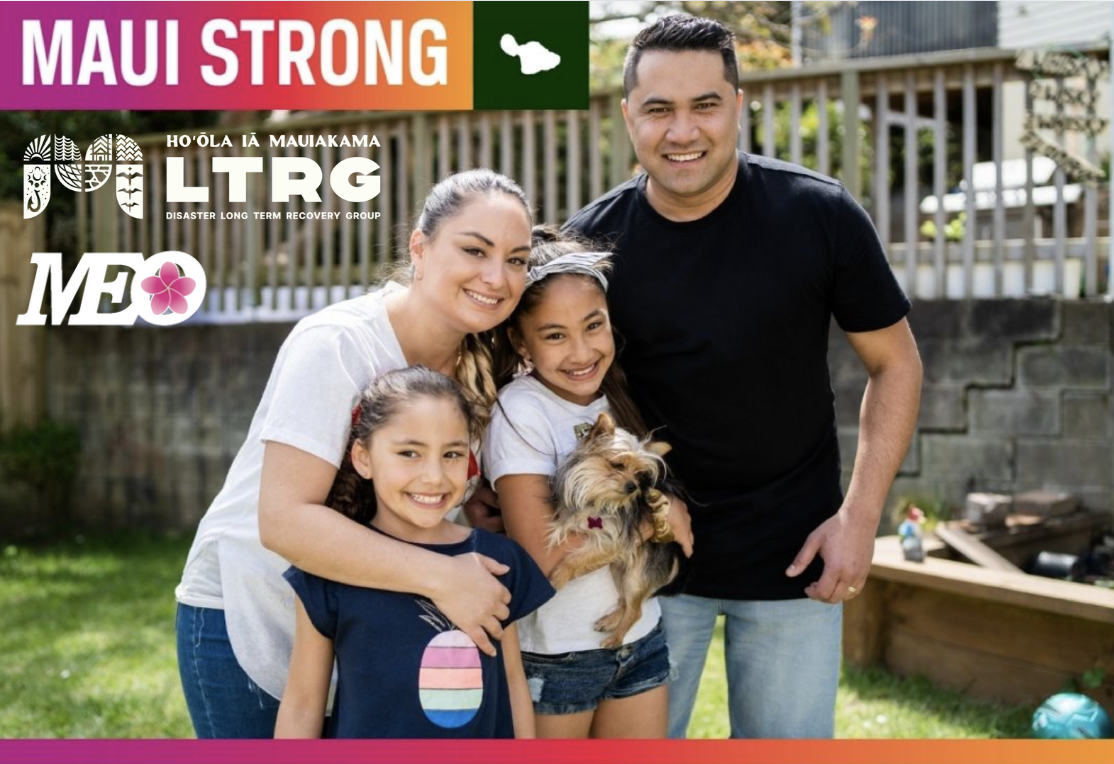August 19, 2025

MAUI, HI – Maui Economic Opportunity (MEO) announces that applications are now open for the Maui Disaster Stabilization Grant, a new grant program that provides up to $25,000 in direct financial support to 2023 Maui Wildfire survivors to assist with their unmet needs for housing, utilities, transportation, home restoration and healthcare costs. Applications are available as of August 21 and will remain open until funds are depleted.
“The Maui Disaster Stabilization Grant aims to address critical gaps in the long-term recovery process for many families who are still struggling,” states MEO CEO Debbie Cabebe. “Through this $5 million grant from HCF’s Maui Strong Fund, we were able to partner with Hoʻōla LTRG to help wildfire victims who continue to struggle to meet their basic needs.”
Applications for this grant may only be submitted by a Disaster Case Manager (DCM) on behalf of a directly impacted survivor following verification of the survivor’s unmet need. There are no income limitations for eligible survivors, however applicants must be able to provide supporting documentation, such as mortgage or lease agreements, W-9 forms, and bills to verify financial need.
"Our case managers recognize that the road to recovery for our residents has been long and difficult, and they specialize in helping survivors access resources for their unmet needs, such as this grant,” said Rhonda Alexander-Monkres, Executive Director of Hoʻōla LTRG. "We're grateful to have partners like HCF and MEO who understand that true recovery means to help families achieve stability, not just survive day to day."
Survivors without a DCM may enroll with a participating agency to begin the process. See below for details.
Step 1: Connect with a Disaster Case Manager (DCM). Applications can only be submitted by a DCM on behalf of a survivor after the unmet need has been verified.
If you do not have a DCM, enroll with one of the agencies currently accepting new clients:
Ohana Hope Village, Hawai’i Community Lending and Roots Reborn are unable to accept new clients. Existing clients at these agencies should contact their assigned case manager for assistance.
Step 2: DCM Verification and Submission
Your DCM confirms eligibility and submits the application with required documentation (e.g. mortgage/lease agreements, W-9 forms, and relevant bills).
Step 3: Payment Process
Once approved, payments are issued directly to vendors within 30 days.
For additional assistance, please email support@mauilongtermrecovery.org or call (260) 271-9501.
“For nearly two years, we’ve walked alongside Maui’s wildfire survivors, inspired by their courage and resilience,” said Keanu Lau Hee, Senior Director of the Maui Recovery Effort at the Hawai’i Community Foundation. “This partnership with MEO and Ho’ōla iā LTRG is about rebuilding lives and nurturing hope for the future. We are deeply grateful to the donors of the Maui Strong Fund for making this lifeline possible.”
Survivors must:
A true unmet need means:
Example:
✅ Unmet need: Survivor’s temporary housing lease requires a $2,000 deposit they cannot afford, and without it they risk losing safe housing.
❌ Not an unmet need: Survivor can pay their rent from existing income but would prefer to use the grant so they can save money.
Yes, as long as:
If multiple months of payments are approved, the vendor will receive one bulk payment. It is the dcm and client kuleana to notify vendor with how to apply the payment (e.g. please apply to monthly payment due for these months Oct, Nov, Dec and Jan)
Yes, a signed lease or rental agreement can be used.
Other options include utility bills, mortgage statements, or government-issued ID with the current address.
Any resources the survivor is contributing toward the expense, including:
The grant reviewer will communicate directly with the DCM listed on the application unless otherwise arranged. If the grant reviewer needs to speak with the client, the DCM will be informed.
Yes – use Mennonite Disaster Service (MDS) in full to avoid confusion.
DCMs must verify and confirm all required items and keep them in the client file.
Only the specific documents requested in the “Upload Files” section need to be submitted.
(Gather before starting the application to avoid delays)
General:
If you have any questions or need further assistance, please do not hesitate to reach out to get connected to the Disaster Case Management Program.